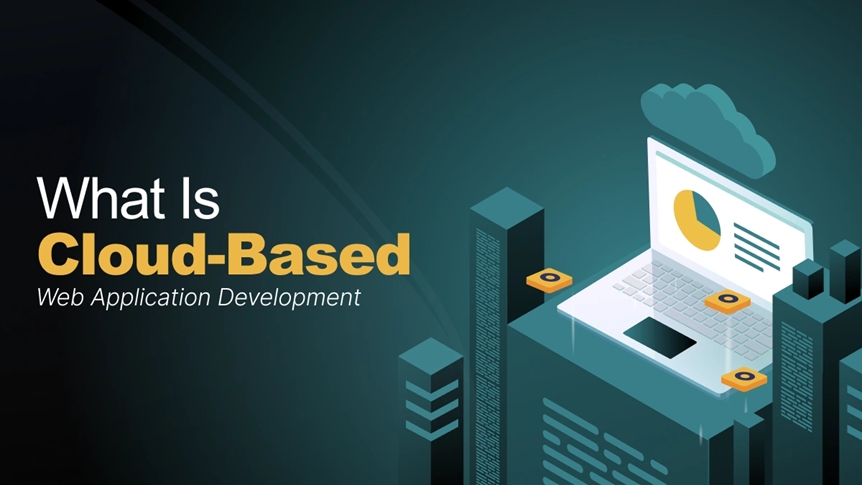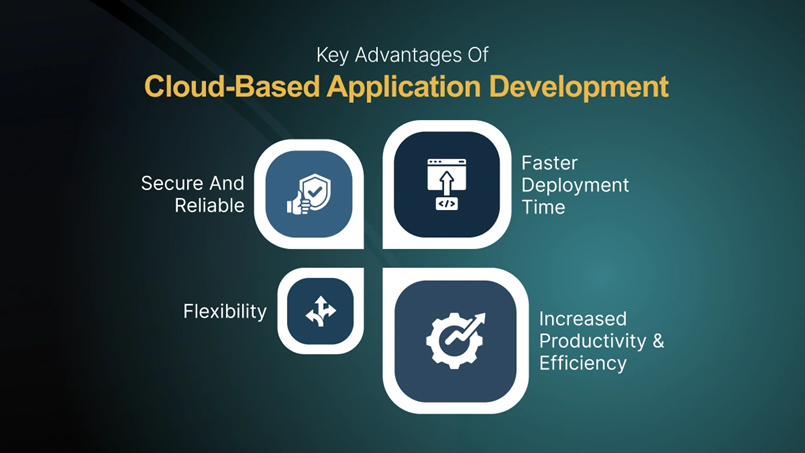What is Cloud-Based Web Application Development

Cloud-based web applications have changed the way businesses and the world work, and people have started to realize the robust benefits.
In this article, we will explore cloud-based web application development, its benefits, and more. Let’s get started.
What is a cloud-based application?
Cloud-based applications are web-based software that can be accessed and operated from anywhere. They are developed using cloud computing, the concept of hosting applications and data on remote servers rather than your hardware.
Therefore, when you utilize cloud-based applications, you don’t have to worry about managing and maintaining servers or hardware.
Types of Cloud Applications in Development
Cloud applications come in a different form. There are many different types of cloud-based apps, each providing robust benefits for clients and businesses.
-
Cloud-Based Web Applications
Web apps operate on the Cloud and can be easily accessed via any mobile device or browser. However, users may need to log in with an account on their devices before viewing the application itself.
-
Enterprise Resource Planning (ERP)
ERP software helps businesses manage all business operations factors, including inventory control and client service. This type of software mainly contains modules like human resources management, accounting, inventory management, and client relationship management.
-
Property Management Software (PMS)
Property Management systems help landlords organize and manage their rental properties more efficiently by automating certain tasks, like collecting rent payments from tenants or sending them maintenance requests. They also enable landlords to keep track of their properties using a database and generate reports on their financial performance.
Types of Cloud-based Application Solutions
-
SaaS – Software-as-a-Service
SaaS is among the popular models for cloud applications as it is easy to implement and understand. With SaaS, you can pay a monthly subscription depending on your server or computer. Moreover, you can utilize this app for anything from watching videos online to booking travel reservations. Because SaaS tools are so easy to adopt across teams, shadow IT discovery becomes essential for identifying unapproved applications, maintaining visibility, and ensuring secure and controlled cloud usage.
-
PaaS – Platform as Service
PaaS is another very famous option for developing your business logic or backend services. It allows you to focus on developing systems, and it gives developers access to tools like databases and messaging systems, so they don’t need to worry about developing systems themselves.
PaaS is mostly considered ideal for software developers who are looking for a managed solution that enables them to focus on their application and leave the infrastructure issues to someone else.
-
IaaS – Infrastructure as Service
Iaas allows users to supply virtual machines at any time and utilize them for different purposes, such as running a website or new software during peak hours or for special events.
The Cloud has made managing and deploying applications much slower, but it’s not without drawbacks. You need to trust the provider with some vital data or allow them access to your cloud app infrastructure to be able to use their services.
Key Advantages of Cloud-Based Application Development

-
Flexibility
Cloud-based development is easily scalable. If your business requires upgrades, you can seamlessly add memory or storage. You can also decrease costs by avoiding and closing cloud applications when you don’t need them.
If you find a better deal with another provider, you can quickly move your data and apps without worrying about setting up new servers or data migration.
-
Secure and Reliable
Cloud applications are highly secure, as they operate in data centers protected by standard security systems. You don’t have to worry about robust external threats like hackers or viruses impacting your data, as it is sorted securely on remote servers.
Cloud technology also decreases downtime if something goes wrong with your hardware; it does not affect other users of the same services.
-
Faster Deployment Time
The most significant benefit of cloud Application development is its fast deployment time. With traditional app development methods, an application must be developed on your server, which may take months or even years, depending on the difficulty.
Once it’s ready for deployment, you need to manually install it on your configure and server everything before making it available for utilization by others. In contrast, with cloud-based apps, all you need to do is create an account with cloud providers like Microsoft Azure, Amazon web server, or Google Cloud Platform (GCP).
Once your application is ready for testing or production purposes, simply upload it to their server, where it will be compiled automatically within minutes.
-
Increased Productivity & Efficiency
Cloud Application Development helps you grow your business more effectively by enabling you to focus on what matters most: your client requirements. With Cloud Application development, you can easily scale up or down as required without having to worry about IT infrastructure or other technical issues, Moreover, you can also make changes easily and quickly without having to spend more time on maintenance. This helps you to save money that you may otherwise spend on hiring additional staff members or buying new hardware or software licenses etc.
How to develop a good Cloud-Based App?
Developing a robust cloud-based application needs effort and is more like developing any other service or product, you need to provide something that people need and make it as easy as possible for them to opt for.
-
Research Your Market
Before you develop anything, it’s vital to research your market and find out what clients want. Do in-depth research, as it will help you make robust decisions and finalize all the factors required to develop the cloud-based app.
Well, after researching you should analyze what kind of problem your app is solving. Once you gain clarity on that, you can move forward with selecting the application type.
-
Select the Application Type
There are different types of applications you can develop like productivity tools, social media apps, game apps, and more. So, the application type can have an impact on the development process, as well as how your app is perceived by users.
For instance, if you are developing a game app, you need to consider all the factors like colors, graphics, and more.
-
Select the robust cloud-based platform
Once you have decided to develop robust applications, now it’s time to select the cloud-based platform on which you to develop your application. Therefore, the most famous cloud-based platforms are Google Cloud platform, Amazon web services, Microsoft Azure, and more.
All of these servers come with exclusive features including processing of data, and cloud storage space. So, it depends on you which will you select for your apps.
-
Select database system
The next step is to select a vital database system that can support your apps. There are database types in the market but not all of them will work well with your specific requirements.
Some applications may need a relational database, while others may be better served by NoSQL or cloud-based solutions like Google Cloud datastore, Amazon DynamoDB, and more.
-
Get Ready to deploy
When you are ready to deploy your apps, you need to take into account the hosting type you need for hosting. If your app is a simple like one-page website, then you may need less in terms of server power and storage space.
Also, if it’s a complex application that depends heavily on database input then, you need to apply it on the cloud instead of buying equipment at home.
Moreover, you can also leverage cloud hosting for deployment to ensure high performance and availability, this is vital for complex applications requiring seamless interactions between user inputs and databases.
Summing Up
Whether you are just starting a new company or start-up or an established, Cloud-based application development that always helps you to grow faster. It is vigorously becoming the recommended method for companies as it has many intuitive features and benefits that can easily deploy software applications.
Moreover, you can also leverage cloud hosting for the betterment of your apps, all you need to do is select the Cloud hosting provider that matches your requirements.


